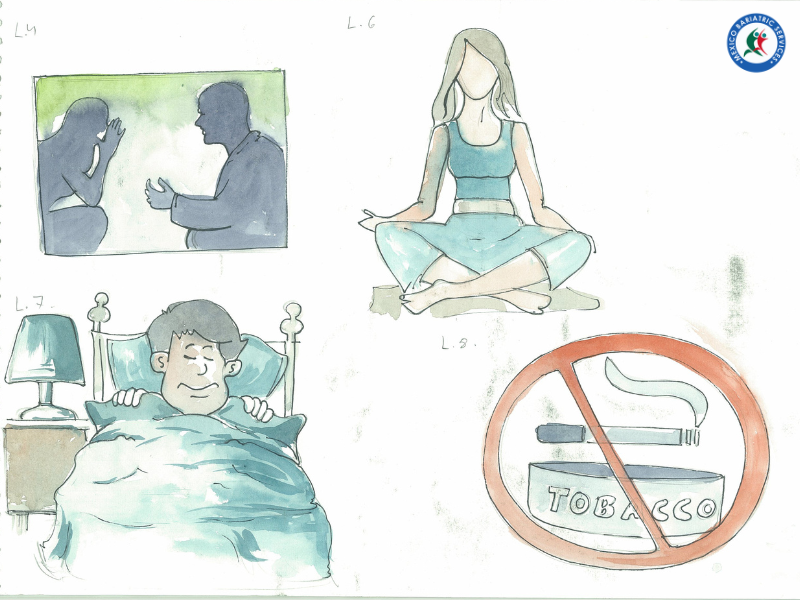How Do I Make Lifestyle Changes After Bariatric Surgery?
Medically Reviewed by Katelyn J. Mock, US-Registered Dietician (R.D.)
After bariatric surgery and even before, you’d have to make major lifestyle changes to reach your goal weight. Starting from changes in diet, portion sizes, planning meals, and physical exercise to mentally preparing yourself, you would have to commit to your goals. But don’t worry because the results far outweigh the efforts.
Diet: Lifestyle Changes after Bariatric Surgery
Weight loss surgery requires some serious dietary changes to guarantee success. This surgery impacts one’s eating habits, and one has to relearn how to eat according to their new stomach.
Portion Control
For the initial days following the surgery, one is on a pureed diet. Slowly, one shifts to a low-fat, healthy diet. Here is where portion control after gastric sleeve becomes crucial.
The main reasons to exercise portion control are –
- To avoid feeling nauseous
- To prevent stretching of the stomach pouch
Eating according to one’s level of physical activity is important. Focus on nutrient-rich eating.
Meal Planning for Lifestyle Changes after Bariatric Surgery
Another part of lifestyle changes after bariatric surgery is the introduction of some serious meal planning. One has to prep meals in advance as it becomes important to eat right and at the right time.
- Meal planning helps make better food choices and helps stay away from binging on junk food.
- It gives you the flexibility of cooking the right amount of food needed.
- A balanced diet, inclusive of a variety of fruits and vegetables, is easily possible for a meal planner.
Eating Right for Lifestyle Changes After Bariatric Surgery
- A person goes through 4 stages of a diet after gastric sleeve surgery. Sticking to the post-op sleeve gastrectomy diet is crucial.
- Certain things like sugar, carbonated beverages like sodas, processed food, and all forms of junk food are much discouraged.
- Consuming seasonal fruits, drinking water and maintaining protein intake from healthy foods is the right way to go.

Foods to Avoid Post VSG
It is strongly recommended not to get calories from drinks. Some things to avoid are[1]Zawn Villines, Medical News Today. “What to eat and avoid on the gastric sleeve diet.” (2017) 23 July 2018.
View in Article
- Sugary snacks
- Deep-fried food
- Desserts
- Calorie loaded food
- Heavily salted foods like potato chips
After gastric sleeve surgery in Mexico, one has to make a shift from calorie-rich food to nutrient-rich food.
Proper Fluid Intake
- Water is needed to sustain life. If a person is not drinking enough water, it can lead to severe dehydration and maybe even hospitalization.
- It is essential to drink enough fluid to avoid constipation and kidney stones. 64 oz of water is the suggested amount of liquid initially.
- Proper water intake is essential, especially after weight loss surgery, because it helps in healing and keeps the immune system healthy.
- The 30-Minute Drinking Rule has to be adhered to while following the diet after bariatric surgery. This means no fluid intake 30 minutes before and after a meal.
A 2016 study shows that 10.54% of the patients are readmitted after bariatric surgery due to dehydration.[2]Aman MW, Stem M et al. “Early Hospital Readmission After Bariatric Surgery” Surgical Endoscopy (2016): 2231-8. 23 July 2018.
View in Article
General Eating Habits Post VSG
- It becomes necessary to eat slowly after thoroughly chewing the food. Dining at the usual pace can cause nausea and bloating.
- It is recommended to have 1-2 bites per minute to avoid any discomfort.
- Special attention needs to be given to the consumption of proteins, as intolerance to high-protein foods can cause protein malnutrition. In such cases, it is beneficial to take the help of a registered dietician.[3]Johnson Stoklossa, Carlene, and Suneet Atwal. “Nutrition Care for Patients with Weight Regain after Bariatric Surgery.” Gastroenterology Research and Practice 2013 (2013): 256145. PMC. Web. 24 July 2018.
View in Article
What are my Nutritional Needs After Gastric Sleeve?
The American Society for Metabolic and Bariatric Surgery states that specific nutritional and dietary guidelines are crucial to maintaining optimum health after weight loss surgery.[4]American Society for Metabolic and Bariatric Surgery. “Life After Bariatric Surgery”
View in Article
Taking Vitamin and Nutrient Supplements
- After bariatric surgery, one needs to be very vigilant with their daily supplements.
- Bariatric patients are required to take multivitamins and doses of Vitamin D, Calcium, Iron, and Vitamin B12.
- This is a lifetime commitment.
Importance of Proteins Post Sleeve Gastrectomy
- To be able to heal faster and to feel fuller, 60g-80g of protein has to be consumed every day.
- Protein supplements help repair the muscle tissue and maintain weight loss as well.[5]Steenackers N, Gesquiere I, et al. “The relevance of dietary protein after bariatric surgery: what do we know?” Current Opinion in Clinical Nutritional and Metabolic Care (2018): 58-63
View in Article
What Changes in Physical Activity Will I do Post Op?
Regular Workouts
It is vital to incorporate working out into one’s daily routine to have a successful weight loss surgery. Find an exercise that works well and won’t cause any injury or pain. This is one of the most important lifestyle changes after bariatric surgery.
Resistance Training
- Females have less muscle mass, so one has to rely on resistance training after bariatric surgery.
- 30 minutes on the treadmill may not be enough.
- Try adding some hand weights for resistance and to build lean muscle mass.
- For instance, try adding 1-2 lb. ankle weights or wrist weights to add those lean muscles.
- One can walk wearing these items, and even this little bit of extra weight makes a big difference by raising one’s metabolic rate.
- According to ObesityAction.org, make sure you strength train at least once a week and keep a gap of at least two days between your strength training sessions.
Amount of Exercise

- It is essential to exercise, gradually increasing the duration and level. Walking, swimming, and yoga are good exercises for beginners as it is not easy to suddenly increase the level of activity.
- The American Association of Metabolic and Bariatric Surgery (ASMBS) recommends 150 minutes of moderate exercise per week. However, Cleveland Clinic suggests no strength training for at least the first three months after surgery.
Overcoming Weight Loss Plateaus
Know that weight loss stalls are standard after bariatric surgery. It can last for a few weeks but can easily stretch to a few months if one does not follow the right diet and exercise regime.
There can be many reasons for weight loss stalls post-bariatric surgery. Lack of fluid balance in the body and a low metabolism rate are some common causes.
It becomes essential to stick to your diet and increase water intake. Protein intake also becomes crucial. Eating a fair share of fruits and veggies is also needed.
How do I Prepare Mentally?
It is important to mentally prepare oneself for the significant lifestyle changes after bariatric surgery. This is why one should carry out some research on what to expect post-op.
Online and Offline Support
- After the surgery comes the hard part. One has to change their way of living. It becomes important to be in good mental health as that helps heal the body quicker.
- There are many online support groups one can join. Support groups come with many advantages. Not only does one come across people who have been or are going through the same experience, but you also meet a bunch of people who will keep you motivated and focused.
- It is the same with offline groups. Bariatric patients can form a local neighborhood society and come together once a week or month and share their good and bad experiences.
- This lets people know that they are not alone.
Post-op Counselling
Research shows that people suffering from morbid obesity also go through psychological co-morbidities like mood disorders, eating disorders, and stress. Both pre-op and post-op counseling can be beneficial to improve the patient’s mental health.[6]Jumbe, Sandra, Claire Hamlet, and Jane Meyrick. “Psychological Aspects of Bariatric Surgery as a Treatment for Obesity.” Current Obesity Reports1 (2017): 71–78. PMC. Web. 24 July 2018.
View in Article
Controlling Snacking and Emotional Eating
Firstly, one needs to identify the cause of hunger. Is it physical, or is it emotional? Not only will overeating cause the new stomach pouch to expand, but it also causes one to feel nauseous.
A Mayo Clinic report says that there is a powerful connection between mood, food, and weight loss. Things like relationship conflicts, stress, and health problems are triggers that can cause emotional eating and weight gain.[7]Mayo Clinic. “Weight Loss: Gain Control of Emotional Eating” 24 July 2018.
View in Article
Some good ways of controlling snacking and binge eating are –
- Maintain a food diary
- Reduce stress
- Confide in friends and family for support
- Eat healthily
- Keep busy
- Therapy
How Can I Make Better Life Choices?
Undergoing gastric sleeve surgery means continuously making better life choices.

No Smoking or Drinking
One should not drink alcohol after weight loss surgery as it contains calories but hardly any nutrition. After the surgery, alcohol is absorbed more quickly by the body. This means that even a small amount of alcohol has a substantial effect on the patient. After surgery, men are more likely to develop an unhealthy dependence on alcohol.[8]GREGORIO, Valeria Duarte, et al. “THE ALCOHOL CONSUMPTION IS AMENDED AFTER BARIATRIC SURGERY? AN INTEGRATIVE REVIEW.” Arquivos Brasileiros de Cirurgia Digestiva : ABCDSuppl 1 (2016): 111–115. PMC. Web. 24 July 2018.
View in Article
Smoking slows gastric emptying of solids and can enhance nausea and vomiting that occurs after the IB procedure.[9]Maniscalco, Mauro et al. “Smoking Habit in Severe Obese after Bariatric Procedures.” Tobacco Induced Diseases1 (2015): 20. PMC. Web. 24 July 2018.
View in Article
Drinking, alcohol, and smoking carry independent health risks as well. So, it is better to stay away from them.
Pregnancy after Bariatric Surgery
Pregnancy after WLS is generally not a problem. It is recommended to wait for about 18 months after the surgery to get pregnant. It would be a major part of lifestyle changes after bariatric surgery.
While studies show that bariatric surgery can potentially improve fertility in obese women, patients are advised against pregnancy because their body is in weight-loss mode, and they are not able to consume enough calories to sustain the baby.[10]Slater, Christopher, et al. “Nutrition in Pregnancy Following Bariatric Surgery.” Nutrients 12 (2017): 1338. PMC. Web. 24 July 2018.
View in Article
Follow-up Appointments Post Weight Loss Surgery
It is important to be particular about follow-up appointments after any bariatric procedure. This helps detect potential health issues well in time.[11]Mayo Clinic. “Bariatric Surgery: Tests and Procedures.” 24 July 2018.
View in Article
Another lifestyle change after bariatric surgery accompanying weight loss surgery is to get blood tests done every six months to keep a tab on one’s nutritional deficiencies.
This Post Addresses
- Life after bariatric surgery – blogs
- Drinking alcohol after bariatric surgery
- Long-term diet after gastric bypass surgery
- Post-bariatric surgery diet
- Life after gastric sleeve surgery
- Preparing for bariatric surgery
References
- Zawn Villines, Medical News Today. “What to eat and avoid on the gastric sleeve diet.” (2017) 23 July 2018.
- Aman MW, Stem M et al. “Early Hospital Readmission After Bariatric Surgery” Surgical Endoscopy (2016): 2231-8. 23 July 2018.
- Johnson Stoklossa, Carlene, and Suneet Atwal. “Nutrition Care for Patients with Weight Regain after Bariatric Surgery.” Gastroenterology Research and Practice 2013 (2013): 256145. PMC. Web. 24 July 2018.
- American Society for Metabolic and Bariatric Surgery. “Life After Bariatric Surgery”
- Steenackers N, Gesquiere I et al. “The relevance of dietary protein after bariatric surgery: what do we know?” Current Opinion in Clinical Nutritional and Metabolic Care (2018): 58-63
- Jumbe, Sandra, Claire Hamlet, and Jane Meyrick. “Psychological Aspects of Bariatric Surgery as a Treatment for Obesity.” Current Obesity Reports1 (2017): 71–78. PMC. Web. 24 July 2018.
- Mayo Clinic. “Weight Loss: Gain Control of Emotional Eating” 24 July 2018.
- GREGORIO, Valeria Duarte et al. “THE ALCOHOL CONSUMPTION IS AMENDED AFTER BARIATRIC SURGERY? AN INTEGRATIVE REVIEW.” Arquivos Brasileiros de Cirurgia Digestiva : ABCDSuppl 1 (2016): 111–115. PMC. Web. 24 July 2018.
- Maniscalco, Mauro et al. “Smoking Habit in Severe Obese after Bariatric Procedures.” Tobacco Induced Diseases1 (2015): 20. PMC. Web. 24 July 2018.
- Slater, Christopher, et al. “Nutrition in Pregnancy Following Bariatric Surgery.” Nutrients 12 (2017): 1338. PMC. Web. 24 July 2018.
- Mayo Clinic. “Bariatric Surgery: Tests and Procedures.” 24 July 2018.

